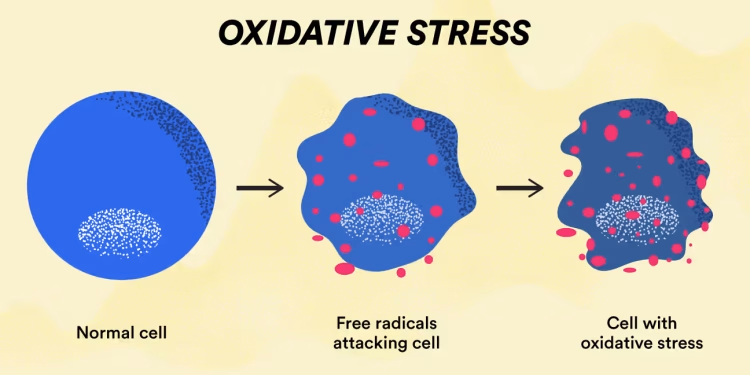Free radicals are unstable molecules that play a significant role in various biological processes, including aging and disease development. While they are naturally produced by the body, excessive free radicals can lead to oxidative stress, which may contribute to chronic health conditions. Understanding free radicals, their sources, effects, and how to neutralize them is essential for maintaining overall well-being.
What Are Free Radicals?
Free radicals are atoms or molecules with unpaired electrons, making them highly reactive. Because of this instability, they seek out other molecules to steal electrons from, which can cause cellular damage. This process, known as oxidation, occurs continuously in the body and is a natural part of metabolism. However, an excess of free radicals can lead to harmful effects on tissues and organs.
Sources of Free Radicals
Free radicals are generated both internally and externally. Some common sources include:
Internal Sources
- Metabolism: Normal cellular processes such as energy production in the mitochondria naturally generate free radicals.
- Inflammation: The immune system produces free radicals to fight infections, but excessive inflammation can lead to oxidative stress.
- Exercise: While physical activity is beneficial, intense workouts can temporarily increase free radical production.
External Sources
- Pollution: Exposure to environmental pollutants such as smoke and industrial chemicals increases free radical levels.
- Radiation: Ultraviolet (UV) rays from the sun and exposure to X-rays can generate free radicals in the body.
- Smoking and Alcohol: Both tobacco smoke and excessive alcohol consumption contribute to oxidative stress by increasing free radical production.
- Processed Foods: High-fat and highly processed foods can trigger oxidative reactions that promote free radical formation.
Effects of Free Radicals on the Body
When free radicals accumulate beyond the body’s ability to neutralize them, oxidative stress occurs. This imbalance can damage DNA, proteins, and lipids, leading to various health issues, including:
- Aging: Oxidative damage is one of the key factors in the aging process, contributing to wrinkles, sagging skin, and loss of cellular function.
- Cardiovascular Disease: Free radicals can oxidize cholesterol, leading to plaque buildup in arteries and increasing the risk of heart disease and stroke.
- Cancer: DNA damage caused by free radicals may trigger genetic mutations that contribute to the development of cancerous cells.
- Neurodegenerative Diseases: Oxidative stress is linked to conditions like Alzheimer’s and Parkinson’s disease due to its damaging effects on brain cells.
- Inflammatory Disorders: Chronic inflammation fueled by oxidative stress can worsen conditions such as arthritis and autoimmune diseases.
How to Neutralize Free Radicals
The body has natural defense mechanisms to combat free radicals, primarily through antioxidants—compounds that stabilize free radicals by donating electrons without becoming unstable themselves. To enhance the body’s ability to counteract oxidative stress, consider the following:
Consume Antioxidant-Rich Foods
A diet rich in antioxidants can help neutralize free radicals. Some of the best sources include:
- Fruits and Vegetables: Berries, citrus fruits, spinach, kale, and carrots contain high levels of vitamins C and E, which are powerful antioxidants.
- Nuts and Seeds: Almonds, walnuts, and sunflower seeds provide vitamin E and healthy fats that combat oxidative stress.
- Green Tea: Loaded with polyphenols, green tea has strong antioxidant properties that help fight free radical damage.
- Dark Chocolate: High-quality dark chocolate contains flavonoids, which help protect cells from oxidative stress.
Maintain a Healthy Lifestyle
- Exercise in Moderation: Regular moderate exercise boosts the body’s antioxidant defenses, but excessive strenuous activity may increase free radical production.
- Avoid Smoking and Excessive Alcohol: Reducing exposure to tobacco smoke and limiting alcohol intake can lower oxidative stress.
- Use Sun Protection: Wearing sunscreen and protective clothing can prevent UV-induced free radical formation.
- Manage Stress: Chronic stress increases oxidative stress; practicing mindfulness, yoga, or meditation can help reduce its impact.
Conclusion
Free radicals are an unavoidable part of life, but their harmful effects can be minimized through a healthy diet, lifestyle choices, and proper antioxidant intake. While the body naturally regulates free radical levels, excessive exposure can lead to chronic diseases and premature aging. By understanding how free radicals work and taking proactive steps to combat oxidative stress, you can enhance your overall health and longevity.























